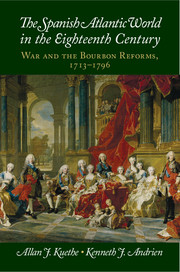Book contents
- Frontmatter
- Contents
- Introduction: War and Reform in Spain and Its Atlantic Empire
- I Alberoni, Patiño, and the Beginnings of Atlantic Reform, 1713–1736
- II The Second Wave of Reform, 1736–1763
- III Pinnacle of the Bourbon Reforms, 1763–1796
- 7 The First Phase of Reform under Charles III, 1763–1767
- 8 The Reorganization of Spain’s Atlantic Empire, 1767–1783
- 9 Adjustments and Refinements in the Reformist Agenda, 1783–1796
- Conclusion: War and Reform in the Spanish Atlantic World
- Timeline for the Spanish Atlantic World in the Eighteenth Century
- Bibliography
- Index
- Plate section
- References
Conclusion: War and Reform in the Spanish Atlantic World
Published online by Cambridge University Press: 05 June 2014
- Frontmatter
- Contents
- Introduction: War and Reform in Spain and Its Atlantic Empire
- I Alberoni, Patiño, and the Beginnings of Atlantic Reform, 1713–1736
- II The Second Wave of Reform, 1736–1763
- III Pinnacle of the Bourbon Reforms, 1763–1796
- 7 The First Phase of Reform under Charles III, 1763–1767
- 8 The Reorganization of Spain’s Atlantic Empire, 1767–1783
- 9 Adjustments and Refinements in the Reformist Agenda, 1783–1796
- Conclusion: War and Reform in the Spanish Atlantic World
- Timeline for the Spanish Atlantic World in the Eighteenth Century
- Bibliography
- Index
- Plate section
- References
Summary
War and reform evolved into central, interconnected themes of the Spanish Atlantic world during the eighteenth century. War influenced the direction and outcome of Bourbon reforms, and policy innovations periodically sparked military conflicts with Spain’s rivals. Spain’s competition with France, the Netherlands, and Great Britain, more specifically, led to frequent hostilities, sometimes over European affairs and other times over colonial rivalries. The Spanish crown viewed commerce with the Indies as a closed metropolitan monopoly, guaranteed by the papal donation of 1493. As a result, the Spanish claimed complete sovereignty over the lands in the Indies and the surrounding sea lanes, and they wanted to shut out all foreign intruders. For their part, other European powers, particularly the British, had long sought direct access to Spanish American markets, and they viewed Spain’s monopolistic policy as an unfair restriction of trade. The recurrent outbreaks of war that resulted from disputes over access to Spain’s colonial markets in the Atlantic, often complicated by conflicting dynastic ambitions in Europe, sometimes derailed reform and interrupted policy designs in its empire, and they frequently led to the abandonment or discrediting of reformist objectives. On other occasions, however, war could impel reform, as Bourbon ministers enacted policies to prepare Spain for looming conflicts with her enemies. From the end of the War of the Spanish Succession in 1713, reformers repeatedly promoted a series of innovations to modernize the Spanish Atlantic world, at least until the outbreak of war with Great Britain in 1796. In that conflict, the British navy cut the sea lanes between Spain and America, leading to a precipitous decline in tax remittances and trade from the Indies and ultimately to the slow strangulation of the eighteenth-century reforming impulse.
- Type
- Chapter
- Information
- The Spanish Atlantic World in the Eighteenth CenturyWar and the Bourbon Reforms, 1713–1796, pp. 346 - 356Publisher: Cambridge University PressPrint publication year: 2014

